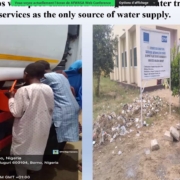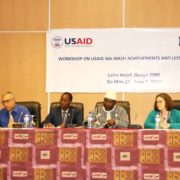WEBINAIRE SUR LES SOLUTIONS ET INNOVATIONS DANS LE SECTEUR WASH MAJI AFRICA
l’article présente les résultats des travaux de recherches dans le secteur du wash de trois jeunes africains à savoir : KOTIE SIDIBE de nationalité Malienne diplômée d’un Master 2 en géomatique, aménagement, gestion des territoires de l’Université des Sciences Sociales et de Gestion de Bamako ; FOUTAMATA MALEBA COULIBALY de nationalité Malienne Etudiante en master Génie Environmental à L’ Eni/ABT de bamako(Mali) et CHARLES TAPALNA de nationalité Nigériane es Master en études stratégiques de l’Université de Maiduguri
L’objectif était d’analyser les différentes solutions et innovations dans le secteur du wash au Mali et au Nigéria. L’approche méthodologique utilisée par les trois chercheurs dans le secteur du wash nous présente les différents modes de collecte des données directe (enquête de terrain, documentation physique) et collecte indirecte (recherche documentaire en ligne). Les résultats de ses travaux se présentent comme suite :
_ s’agissant des travaux de recherche de KOTIE SIDIBE qui sont intitulés :« APPORT DU SIG DANS LA GESTION DES DECHETS D’EQUIPEMENTS ELECTRIQUES ET ELECTRONIQUES DANS LA COMMUNE VI DU DISTRICT DE BAMAKO »
Au total, 274 sites ont été géolocalisés dans les onze (11) quartiers de la commune VI : Banankabougou (36), Dianéguéla (18), Faladié (32), Magnambougou (34), Missabougou (14), Yirimadio (42), Sokorodji (18), Sogoniko (25), Niamakoro (23), Sénou (23), Zone aéroportuaire (9)
Comme solution technologique innovante, elle propose un système d’informations géographique (SIG), un excellent outil pour assurer le suivi de tous les acteurs, les trajets de distributions, la fréquence des grossisses, et d’autre part, une planification du traitement (organisation des acteurs de traitement existante, réalisation de nouveaux emplacements pour les acteurs). Elle propose aussi la mise sur pied, des textes législatifs régulant le domaine de la gestion des déchets électriques au Mali
- S’agissant des travaux de recherche de FOUTAMATA MALEBA COULIBALY avec pour titre :« APPROCHE DE REDUCTION DES EAUX NON FACTUREES DANS LES SOCIETES D’EAUX (SOMAPEP/SOMAGEP(Bamako) »
Les contrats de concession (SOMAPEP-SA) et d’affermage (SOMAGEP-SA) du réseau de distribution de Bamako devrait être 81%, mais il se situe aux environs de 63% soit 18 points d’écart. Ce qui entraine de nombreuses pertes pour la SOMAGEP-SA. Comme solutions, elle propose la modernisation des systèmes de mesures (compteurs plus précis et télé relevables)
- S’agissant des travaux de recherche CHARLES TAPALNA donc le titre est :« ÉVALUATION DE L’IMPACT DE LA PARTICIPATION DES FEMMES AU COMITÉ D’EAU, D’ASSAINISSEMENT ET D’HYGIÈNE SUR LES SERVICES DE LAVAGE DURABLES ET MISE EN ŒUVRE DES MEILLEURES PRATIQUES À MAIDUGURI, NIGERIA »
Comme solutions innovantes aux défis rencontrées par les femmes dans les pratiques actuelles au Nigéria en matière d’eau et d’assainissement, d’hygiène, et d’assainissement nous avons la fourniture de pompes à eau fonctionnant à l’énergie solaire, d’unités mobiles de purification de l’eau, promotion de l’hygiène au niveau communautaire, fourniture de kits WASH d’urgence et formation/renforcement des capacités
l’article permettra de renforcer les capacités des jeunes chercheurs et innovateurs dans le domaine de l’eau, de l’assainissement et de l’hygiène en Afrique
Pour plus d’informations veuillez cliquer sur le lien ci-dessous
Partager l’enregistrement du webinaire :
https://us06web.zoom.us/rec/share/0YaNR8CZ_2PeZqiGcbsGsSlPFEx-oEnejutKxWupfX337H4I0m2-Dm0VXhUOw-HX.FuWF_pIO7TTzKTT6
Code secret : 4hk0p8+4

 AAEA
AAEA

